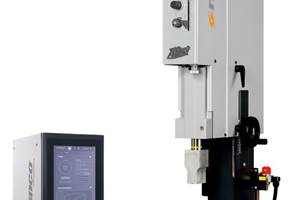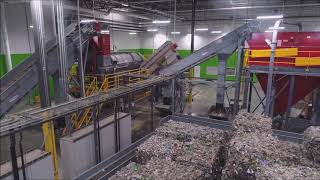SD Polymers: 'One-Stop Solution for Mechanical Recycling'
‘Passionate’ recycler invests in people and technology to meet commitment to innovative, sustainable solutions for its processor customers.
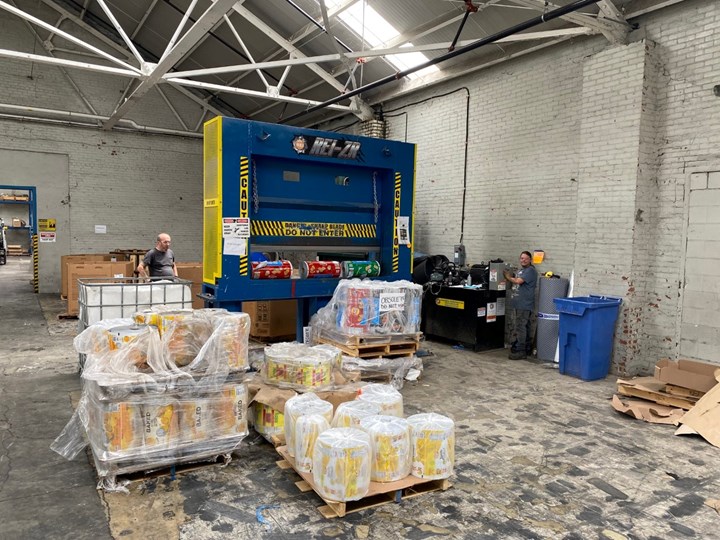
Installation of this large guillotine marked the first phase of the company’s large expansion investment slated to be completed by year’s end. (Photos: SD Polymers LLC)
For SD Polymers, a rapidly expanding recycler and compounder, investing in technology and finding and training people who are “passionate” about recycling are keys to meeting current industry challenges such as material price swings, logistical obstacles and inflationary pressures.
Family owned since 1998, the Macon, Ga., company has diversified into three business segments, headed by its core Plastics Extrusion Division, which focuses on closed-loop recycling and compounding—90% custom in-house compounding and 10% toll compounding. The other two divisions focus on industrial rubber recycling and compounding and non-woven roll converting. According to Stefano Danese, the company’s managing director, SD Polymers is committed to finding innovative, sustainable solutions for its customers to save time and money, increase efficiency and reduce its carbon footprint while improving the bottom line.
‘One-Stop Solution for Mechanical Recycling’
The company traces its roots to Marco Danese, Stefano’s father, who founded the company in 1998, drawing on decades of roofing experience, including the establishment of five roofing manufacturing plants in three countries. SD Polymers originally focused on supplying nonwoven PET mat and densified PP to a wide range of commercial roofing manufacturers, primarily in Latin America. Over time, the company expanded its offerings to include fiberglass PET mat and materials for TPO membrane roofing applications.
Today, the Macon facility of more than 160,000 ft2 includes a full-scale laboratory for raw-materials and finished-goods testing. The company recycles a variety of materials into pellets, densified flake and regrind for injection molding and extrusion—mainly PP, HDPE, LDPE, LLDPE, TPO and PS.
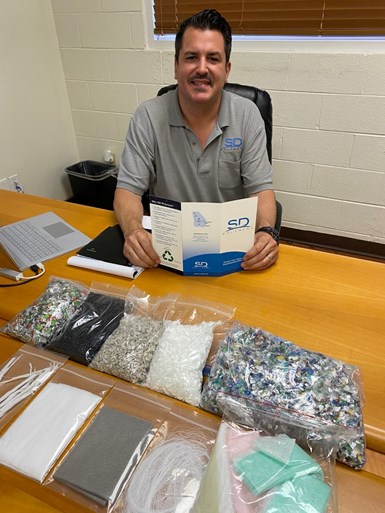
SD Polymers managing director Stefano Danese is the chief problem solver for customers looking to enhance sustainability and save money on materials.
Before joining the family business in 2008, Stefano Danese served as plant manager for General Industrial Polymers in Baytown, Tex. He also holds a B.S. in Business Administration and Management from the Georgia Institute of Technology.
Danese is the number one problem solver for SD Polymer’s customers, and his main goal is to help them achieve a solid sustainability program by offering recycling solutions to eliminate landfill costs and environmental headaches, as well as save them significant money on raw-material procurement. He aims for continuous improvement of the company’s internal processes to position SD Polymers as the go-to place for post-industrial and post-consumer plastic and tire rubber recycling. He also engages with the company’s R&D team on a daily basis to ensure the company is offering the best products and services to its customers.
Danese defines the company’s overall philosophy as, “Hire people that are passionate about recycling, give them the tools needed to be successful, and be the one-stop solution for mechanical recycling in the U.S.” He says this includes giving his team training, mentoring and responsibility, along with the necessary production and lab equipment so they can drive efficiencies in the company “so that the company is successful and ultimately everyone is successful.”
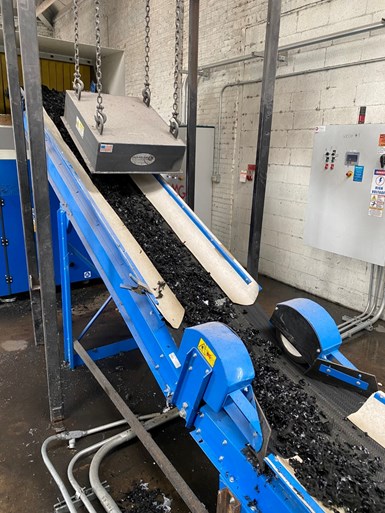
SD Polymers recycles and pelletizes PP, HDPE, LDPE, LLDPE, TPO, and PS for injection molders and extruders.
Investing in Capacity and Quality
SD Polymers is fueling its growth with acquisition of an arsenal of new machinery, including a 48 × 87 in. hydraulic guillotine, its largest to date. The new equipment has improved production rates and increased capacity in anticipation of further growth. It also is allowing the team to increase the breadth of its product offerings. Danese says this addition marks the first phase of capital investments this year, as the company commits to major growth to support current and future customers. SD Polymers will have an additional 130,000-ft2 building expansion and multiple recycling lines installed before year’s end.
“Quality-control testing is everything and a key factor in driving growth,” says Danese. SD Polymers maintains a full-scale laboratory staffed by trained quality- assurance technicians, who check all raw materials and finished goods across a spectrum of criteria.
“We can accept all forms of recycled plastic and perform grinding, densifying and pelletizing in-house.”
The lab is equipped for testing melt-flow index, density, specific gravity, moisture content, tensile strength, notched Izod impact, ash content and DSC (Differential Scanning Calorimetry).
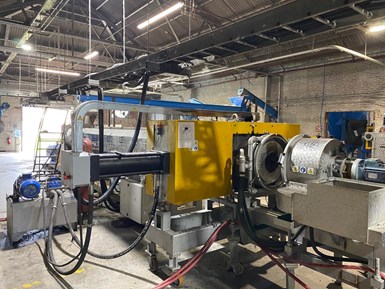
The company’s in-house reprocessing and compounding capabilities currently include two single-screw extrusion lines of 130-mm and 180-mm diam., with additional equipment planned for this year.
SD Polymers’ in-house compounding capabilities include two single-screw extrusion lines of 130 mm and 180 mm diam. The company offers a complete suite of toll services for plastics customers. With its high-capacity size-reduction machinery, SD Polymers can handle a client’s production scrap and process it according to their specifications so that toll customers can reuse it in molding, compounding or other manufacturing.
“We can accept all forms of recycled plastic and perform grinding, densifying, and pelletizing all in-house. At the moment, we perform pelletizing and compounding on both extrusion lines. As we grow, we will install more extrusion lines and dedicate the line to either single-stream reprocessing or compounding.”
He cites the example of receiving truckloads of PP and HDPE paint containers and transforming them into repro pellets which were then sent back to the manufacturer to be incorporated into more containers.
“Having a certain amount of material in our warehouse allows us to better absorb frequent up-and-down price swings.”
“When we run one single stream like this through our extrusion line, we generate a reprocessed pellet. If we are blending two or more recycled polyolefins, then we are compounding. It’s either a repro or compounded pellet that comes out at the end of the extrusion lines.”
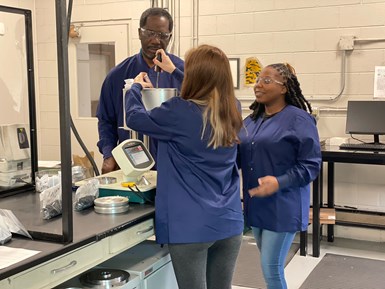
Lab lead Skylar Linto (center) conducts a training session on MFI testing with lab technicians Bernard Collier(left) and Briannia Exum (right).
Key Challenges and Future Plans
Among the key challenges facing the company, Danese cites ongoing monthly price fluctuations for materials, inflationary pressures and logistical pains. The company addresses these challenges by planning as early as possible to get in front of the logistics issues and build up adequate raw-material and finished-product stock to ensure a safety reserve. “Having a certain amount of material in our warehouse allows us to better absorb frequent up-and-down price swings.”
The company sees the business case for reshoring as very strong. Danese notes that the main drivers of this trend include rising offshore wage rates and more refined metrics of total cost of ownership to uncover the hidden costs and risks of offshoring. “In many cases, companies find that although the production cost is lower offshore, the total cost is higher, making it a good economic decision to reshore manufacturing back to the U.S.,” he says. Another driver of reshoring is the opportunity to reduce costs with sustainable strategies such as improved product design, innovation, automation, and lean strategies.

Before year’s end, SD Polymers will have completed an additional 130,000-ft2 building expansion and installed multiple mechanical recycling lines.
Related Content
Inline Measurement Adds Module for Inspection of High-Gloss Vehicle Trims
Pixargus’ Shiny Detection module casts a pattern of structured light onto the high-gloss surfaces of the profiles to be inspected.
Read MoreCobot Automates Label Reel Loading for High-Volume PET Beverage Bottles
Sidel’s new CoboREEL system uses a cobot to automate a shift’s worth of label reel loading.
Read MoreNext-Generation Workhorse Ultrasonic Welding Machines
NPE 2024: Rinco Ultrasonics’ line of standard ultrasonic welding machines significantly upgraded.
Read MoreHigh-Throughput, Robust Thermoformer
NPE2024: WM Thermoforming’s new generation of FC1000 IM2 offers the highest throughput per square feet.
Read MoreRead Next
Plastics Recycler CarbonLITE Expands Capacity at Dallas Plant
New equipment in the 220,000 square-foot, $62 million Dallas plant, opened in 2017, includes an additional extrusion line.
Read MorePeople 4.0 – How to Get Buy-In from Your Staff for Industry 4.0 Systems
Implementing a production monitoring system as the foundation of a ‘smart factory’ is about integrating people with new technology as much as it is about integrating machines and computers. Here are tips from a company that has gone through the process.
Read MoreFor PLASTICS' CEO Seaholm, NPE to Shine Light on Sustainability Successes
With advocacy, communication and sustainability as three main pillars, Seaholm leads a trade association to NPE that ‘is more active today than we have ever been.’
Read More
















